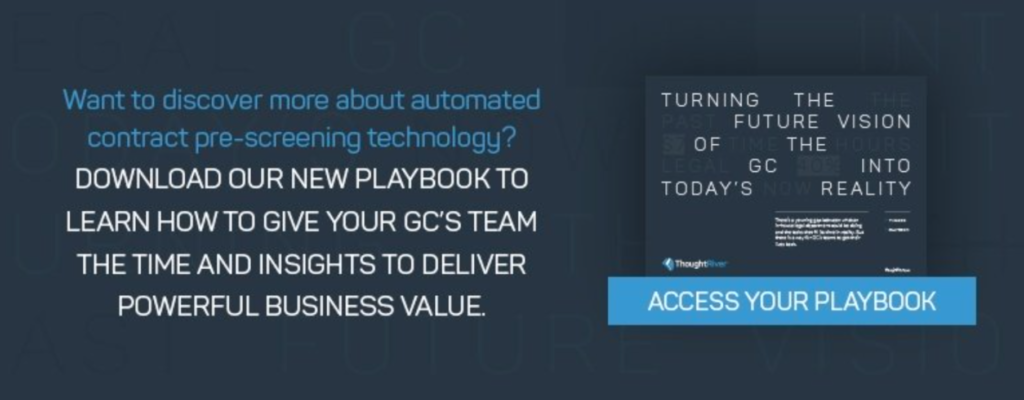
By ThoughtRiver
With the General Counsel’s team under pressure from all sides to deliver more with less, smart automated technology can provide a solution – but it needs to be approached in the right way.
Feeling The Squeeze
In recent years, there’s been increasing pressure on lawyers to deliver more with less. And this pressure has come from both internal and external sources.
In-house legal teams are expected to continue to deliver exceptional service to the wider business – if not add even more value year on year. Meanwhile clients are also questioning the size of their legal bills and wanting to reduce risks.
The net result is that lawyer time – even at relatively senior levels – is monopolised on delivering basic essentials. This means less time for these highly educated and capable individuals to:
- Exercise genuine legal judgment to support the strategic imperative of the business,
- Offer counsel to executives on commercial issues,
- Provide insight into the opportunities and risk that reside within legal documents.
Exploring Tech Opportunities
While other sectors have been quick to embrace the potential of innovative technology, the legal profession’s traditional aversion to risk has meant it has been much slower to respond. However, new technology is beginning to have an impact in two key areas:
- Pre-screening: Lawyers can now automate the fairly basic but time consuming task of an initial review of incoming contracts for risks and sections to focus on
- Insight Generation: Technology can provide powerful insights into future performance by reviewing and reporting on a portfolio of contracts
Major law firms are pouring money into AI as a way of automating tasks traditionally undertaken by junior lawyers. Many believe AI will allow lawyers to focus on complex, higher-value work. Simply put, technology is now a key enabler in helping lawyers to achieve their goals without the need for additional resource.

Structured Information
AI is a game changer for legal activities because it generates structured information from unstructured information at superhuman speeds. For example, using AI, lawyers can assess contracts 60 times faster than the time it takes for just paralegals.
A business is the sum of all contractual obligations to suppliers and customers. Once lawyers have used AI tools to obtain, analyse, and organise data from contractual documents, that data can be queried to obtain legal and commercial insights.
A legal counsel could utilise an AI tool that understands accounts payable and accounts receivable as a set of relationships between payment terms, rights to terminate, or break fees, to determine precisely how liquid their contracts are. They can also assess the relative performance of debtors against their contracted payment terms, enabling CFOs/CEOs to make better informed decisions.
Legal data also allows for better governance by offering visibility into what is being contracted and how. Legal teams can flag up risks and anomalies to their CEO for them to meet their governance obligations.
Barriers to Collaboration
When programmers in the tech industry are confronted with a coding problem, no matter how simple or complex, they’ll routinely discuss and produce the solution in free collaboration with a large and active online community. No matter how specific or niche the problem, someone will have already answered the question or published the code to resolve it on StackOverFlow.com and other such sites.
Legal practitioners, on the other hand, have been engrained with values that make them naturally over-cautious in any scenario involving open disclosure and collaboration.
Confidentiality and discretion are rightly at the heart of the lawyer-client relationship. But that culture of non-disclosure impedes collaboration and progress: the kind of progress the tech industry has been enjoying all this while. However, the advent of machine learning artificial intelligence will enable and possibly force a paradigm shift.
Businesses Are Built On Contracts
AI is not just about efficiency – it’s also about intelligence.
Businesses are built on contracts. By definition, the terms of unexpired contracts are forward indicators of corporate value. A typical large organisation can have more than 100,000 live contracts across its shareholders, debtors, creditors, employees, suppliers, contractors, and partner networks.
But few truly understand the contractual estate with ease, to identify risk, ensure consistency, or perhaps to set a benchmark against which to compare the contractual basis of a possible acquisition target. For the first time, AI makes that feasible because it’s commercially viable for an AI tool to go through thousands of documents again and again, each time the lawyer wants to find certain custom information.
For example, a lawyer can have the ability to know what standard position has been agreed with each counter-party already or whether they always renegotiate a particular provision, but never succeed in getting that into their contracts.
Taken in combination, these productivity and insight gains can power highly valuable legal risk management solutions that will give the innovative collaborators genuine competitive edge.

[ This is a sponsored thought leadership article by ThoughtRiver. ]